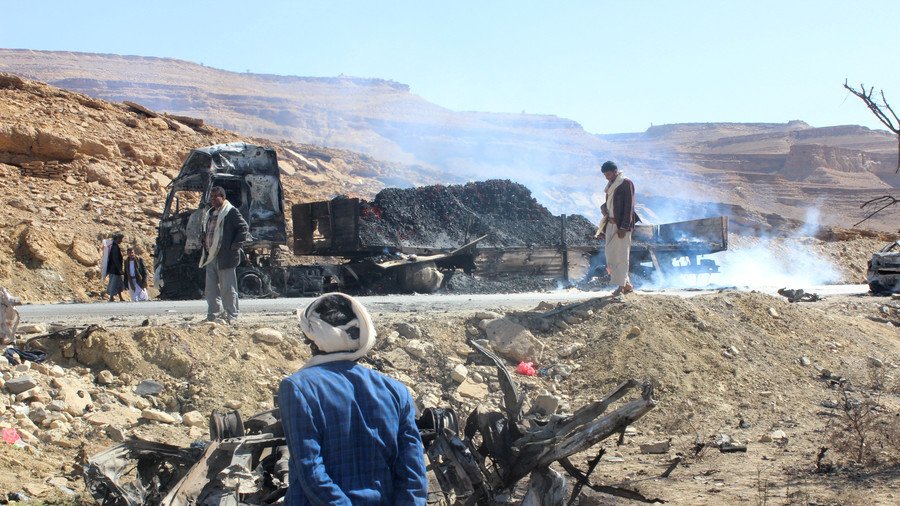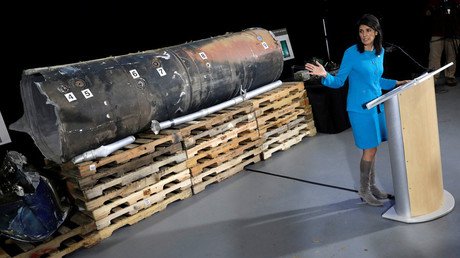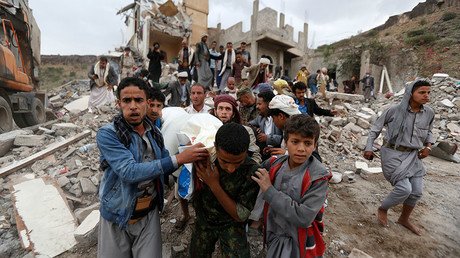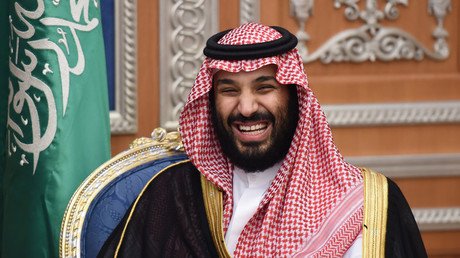UN Security Council passes Russia-sponsored resolution on Yemen after UK's Iran-bashing draft fails

The UN Security Council has unanimously adopted a Russia-tabled draft that will see a technical extension of sanctions against Yemen. It comes after Russia vetoed a rival resolution that blamed Iran for fueling the conflict there.
All 15 UNSC members voted in favor of the draft resolution on Yemen, put forward by Russia as a compromise after it vetoed a rival, “antagonizing” draft submitted by the UK, that also drew criticism from China. The UK had proposed to include a provision that would call out Iran for allegedly violating an arms embargo on Yemen, imposed at the onset of its civil war in 2015. However, that draft gained only 11 votes in support, with Russia and Bolivia voting against and China and Kazakhstan abstaining.
Having said that Russia “fully endorses the majority of the provisions” set forth in the UK-sponsored resolution, Russian UN envoy Vassily Nebenzia noted ahead of the vote that Moscow “cannot concur with uncorroborated conclusions and evidence which requires verification and discussions within the Sanctions Committee.”
Calling the situation in Yemen “far more complicated that we are frequently made to believe,” the Russian diplomat said that the UK draft is aimed at advancing a geopolitical agenda of certain countries and is based on the “selective and contentious conclusions” of the UN experts panel.
The UK draft would have caused “fracturing of security council and sow discord at a time when the Security Council is in dire need of closing its ranks,” he argued, adding that Russia’s concerns about the divisive nature of the UK draft were “shared by many delegates.”
#Nebenzia: Our concerns which are shared by many delegations were disregarded. Putting to vote a draft which does not enjoy approval by all members of #UNSC leads to dividing #UNSC, and promotes disagreements at a time when #UNSC is in dire need of harmony among its members. pic.twitter.com/WzYTQZCh5X
— Russian Mission UN (@RussiaUN) February 26, 2018
“There is a grave danger in toying with geopolitical maps, including with the use of the most volatile material, namely relations within the Islamic world, relations between the Sunnis and the Shiite,” he warned, adding that its approval could have triggered “dangerous, destabilizing ramifications” for the whole region.
Defending the purely technical proposal, that omits any mention of Iran and extends sanctions up to February, 2019, Nebenzia said that its “apolitical” nature is what is necessary to achieve the much-needed unity at the UNSC.
China, which abstained from the vote on the UK draft, sided with the argument, with its envoy saying that the Russian draft “reflects the broadest possible consensus within the Council.”
Describing the situation in Yemen as “very complex,” the Chinese envoy also pointed to the lack of proof of Iran’s supposed violations. “It’s inadvisable to the Council to rush to conclusion in absence of adequate evidence,” he said.
The accusations against Iran stem from the January report of the UN Panel of Experts on Yemen. The report found that some missile debris discovered in Yemen was of Iranian origin, delivered into the country after the embargo was imposed. While the panel accused Iran of flaunting the embargo by “failing to take the necessary measures to prevent the direct or indirect supply”, it fell short of identifying the supplier of the weapons.
In December, US ambassador to UN Nikki Haley posed in front of the partially incinerated remains of a missile, purported to be Iranian-made and fired into Saudi Arabia from Yemen. She did not say when or where the missile was used or fired, or its location when found. Tehran insists it has not violated the embargo and dismissed the accusations, describing the “evidence” showcased by Haley as “fabricated.”
The US immediately lashed out at Moscow for its veto, blaming Russia for shielding a “terrorist-sponsoring” Iran. “Russia prevented accountability and endangered the entire region,” Haley said in ascathing statement ending with a thinly veiled threat: “If Russia is going to use its veto to block action against Iran’s dangerous and destabilizing conduct, then the United States and our partners will need to take actions against Iran that the Russians cannot block,” she said.
Tehran, meanwhile, said it “categorically rejects” all the allegations around its supposed arms supplies to Houthi rebels in Yemen, calling the UK-submitted draft an attempt to deflect attention from the “catastrophic humanitarian situation in Yemen,” caused by the Saudi-led coalition bombings.
The UK and the US representatives, indeed, appeared focused more on pushing Iran’s narrative than on civilians' suffering during their speeches.
The #Yemen panel of expert also had very harsh words for Saudi Arabia, UAE & coalition for using siege & starvation as a weapon of war.No mention of this by UK at #UNSC & in resolution?
— Farnaz Fassihi (@farnazfassihi) February 26, 2018
While the UN panel investigating 10 Saudi airstrikes that caused civilian casualties found last year that, in eight of them, the bombing was unwarranted and “may amount to war crimes,” the UK resolution did not mention any adverse impact of the Saudi-led campaign on the Yemeni population. The same report stated that although some weapons supplied to the Houthis were of Iranian manufacture, there has been no “sufficient evidence to confirm any direct large-scale supply of arms” by the Iranian government.















